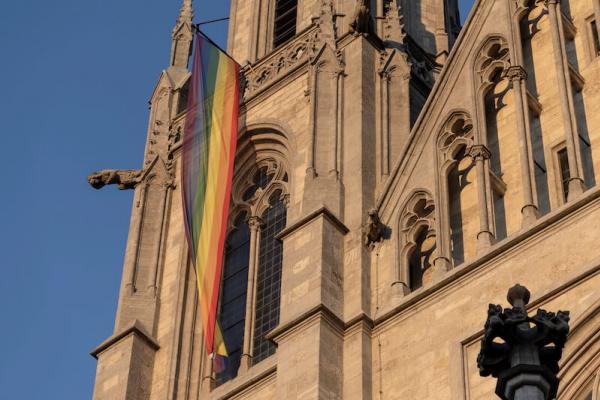I memorized the “biblical defense” against same-sex marriage long before I ever met an openly queer person: “Love the sinner, hate the sin,” “God made Adam and Eve, not Adam and Steve.” My Bible was dog-eared at “clobber passages” such as Genesis 19:1-11, Leviticus 18:22, and Romans 1:25 for quick access should anyone raise a question or instigate a debate on the topic of homosexuality. As a cisgender, heterosexual man, I had little at stake when it came to a definitive “biblical view” of gender and sexuality. The apologetic manuals and evangelical youth group sermons I heard on the topic did not challenge me to expand my horizons but reinforced the assumption that queer folk were not and did not want to be Christians. Instead, I spent Bible studies, worship nights, and student-organized prayer events at public schools like “See You at the Pole” praying for the salvation of (what was to me) an ambiguous LGBTQ community.
My enrollment at a conservative Christian Bible college did little to challenge these beliefs. Institutional engagement with gender and sexuality was manipulative and destructive, offering a front of compassion and love with the sole purpose of bringing down a hammer of judgment and condemnation. However, as my theological imagination began to take shape outside the constructions of whiteness, and I learned about the joys and struggles of LGBTQ friends studying alongside me, I felt more and more discontent with the “biblical” answers I had memorized years ago.
Part of the reason I applied to Princeton Theological Seminary was to explore this line of inquiry more. I sought to learn from queer professors who brought their lived experiences into the courses they taught. I wanted to study with aspiring and gender-diverse theologians, pastors, and leaders and those who wholly affirmed the LGBTQ community. With a disposition of charity and humility, I came eager to listen and slow to speak. While the lessons captured throughout my time at Princeton Seminary could surely fill an entire book, here are four key lessons I learned from my LGBTQ neighbors.
1. God made “Steve” too.
Following a clever rhyme made popular by Jerry Falwell, Christians have often quipped that God made “Adam and Eve” and not “Adam and Steve,” since the 1970s. Following this logic, religious conservatives argue that same-sex relationships are against God’s intended order for creation.
However, while the Genesis account may only record the creation of Adam and Eve, the LGBTQ community affirms that God made “Steve” too. In fact, God loves Steve and is steadfast in pursuit of them (Matthew 18:10-14).
Appealing to the creation of “Adam and Eve” to reject queerness reaffirms a false gender binary. As an Asian American, I have experienced the marginalization that comes from false racial binaries such as the racial triangulation of the “Model Minority” myth. Similarly, gender binaries can oppress and marginalize those who exist outside our social constructs. For those who sit outside of multiple binaries — Black and white, male and female, abled and disabled, marginalized and privileged — the isolation can eventually lead to devastating forms of self-harm.
Time spent studying under and alongside queer Christians presented me with an experience of intersectionality different from my own. As Anglican theologian Rowan William argues, it is the ethical imperative of the Christian to understand these diverse perspectives and struggles; not to appropriate them as our own, but to acknowledge where the experiences of others goes far beyond our own.
2. The “tent” is wide.
One of the great ecclesial debates through the 19th and 20th centuries concerned the breadth of the Christian “tent.” White Southerners questioned whether Christianity was big enough to include Black Americans. Fundamentalists like J. Gresham Machen questioned whether it was large enough to include acclaimed “social gospel” pastors like Harry Emerson Fosdick who emphasized Christian unity over the exclusivist fundamentalist doctrine. Conservative evangelicals in the 1970s questioned whether it was wide enough to include evangelists like Tom Skinner who dared to challenge the whiteness embedded in American Christianity and metropolitan pastors like Troy Perry who provided a boldly affirming worshiping community for queer people in Los Angeles. The fundamental assumption of many evangelicals today is that the Christian tent is not large enough to include the LGBTQ community. Coated in language of love and notions of accepting the person while rejecting their “sin,” most evangelical discourse around gender and sexuality assumes a position of evangelism or mission — as if LGBTQ persons are not already in our pews worshiping alongside us.
To those who argue for a univocal interpretation and practice of the Christian faith, embracing and celebrating tacit difference as a gift from God may sound like a compromise of our faith. But as philosopher James K.A. Smith argues in How to Inhabit Time, we will always find our faith conditioned by the world around us because we are temporal and historically situated beings. This is why we must remain in community and proximity: so that diverse expressions of the same faith might collectively point toward the God to whom all bear witness. When liberation and borderland theologies meet mestizaje and queer theologies, our understanding of God becomes exponentially greater than any single interpretation can offer alone. It is in this meeting that we find openings and opportunities for greater neighbor love, social action, and resolution to the dissonance of hatred and violence in our world.
3. Wrestle with God in stubborn faithfulness.
In a memorable sermon given at Princeton Seminary, associate professor of reformed theology Hanna Reichel draws on the story of Jacob in Genesis 32 to ask this question: Is it possible to wrestle with God in the world and what it would mean to prevail in such an endeavor? Reichel argues that to wrestle with God is to stop running from the darkness of our lives and confront the painful questions we have of ourselves. They conclude that while Jacob might not “win” in this battle, he survives and is allowed to continue his journey as one transformed by this encounter.
Many queer folk bear the scars of wrestling with God in our world today. Rather than running from God, they’ve asked questions, encountering YHWH like Jacob who does not come out of the encounter unscathed. But as Reichel wonderfully articulates, we are not alone in our woundedness. Jesus Christ incarnate also enters God’s creation and is marked by the scars of this wrestling in the divine act of redemption. God is with us, wrestling with us, asking questions of us, and drawing us out of darkness and into a healing light.
Queer folk and the theology that arises from their experience teach me that questions are often God’s path into the hearts of the lost and found. In other words, queer theology invites us into a collective questioning where we might journey together in the restlessness and confusion of life’s questions, trusting in faith that God will meet us on this road. I’ve also learned that Christians must be, as Reichel puts it, “stubbornly faithful” before the world as we, like Jacob, demand a response from God (Genesis 32:26). In the face of Christians who discount queer faith as inauthentic, lesser, or nonexistent, the LGBTQ Christian community continues to be resilient — stubbornly faithful to the calling which they have received.
4. Theological conviction and political action go hand-in-hand.
Insomuch as our theological convictions tell us who we are, we must utilize our privileges and rights as citizens to advocate and defend the rights of our neighbors. Because scripture proclaims that we are all made in the image of God (Genesis 1), that we are called to love one another (Mark 12), that God has called us into unity in difference (John 17), and that we are to use the worldly power and privileges given to us by God for the purposes of God’s redemptive action in the world (Acts 16:35-40), we must act beyond the walls of the church.
As senators enact anti-LGBTQ laws and many Christians continue to distance themselves from their queer neighbors, the church must work toward upholding the rights and dignity of all people including in the public sector. However, we must remember what public scholar Michael Wear advises concerning Christian political action: “The real challenge is to bring our faith to our politics without confusing the two and forgetting which sent us where.”
I celebrate the company of my LGBTQ neighbors in my academic, ecclesial, and personal circles and I hope to exemplify the patience, love, grace, and joy my queer siblings have modeled for me.
Editor’s note, Jun. 15, 2022: An earlier version of this article incorrectly stated that Troy Perry provided a worship community for queer people in New York City; the worship space was originally located in Los Angeles.
Got something to say about what you're reading? We value your feedback!






